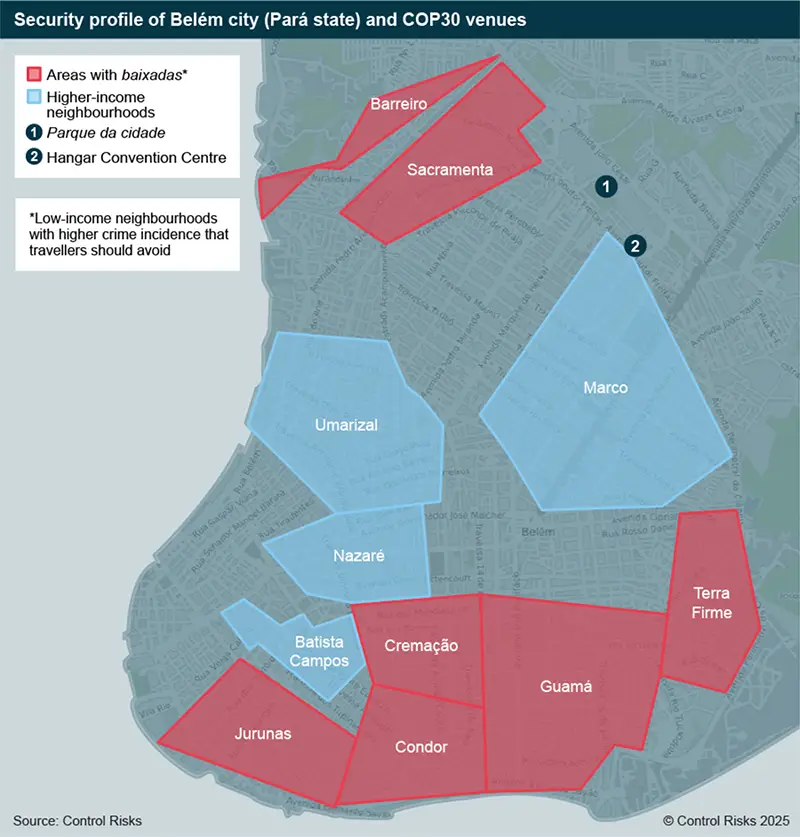As global temperatures climb and scientific warnings grow more urgent, COP30 is being positioned not just as another milestone in climate diplomacy, but potentially the final window for an orderly global transition. Yet, this year's summit, hosted in Belém, Brazil, will take place amid growing fractures in the multilateral system and intensifying geopolitical rivalries.
For multinational corporations, particularly those navigating complex global operations and supply chains, COP30 represents more than a climate summit. It is a strategic inflection point – one with significant implications for regulatory risk, stakeholder engagement, supply chain security, reputational resilience and long-term competitiveness.
Multilateralism is fracturing – climate risk is not
The effectiveness of global climate governance is under strain. A fragmented international order – fuelled by geopolitical competition, nationalism and waning trust in institutions – is undermining cohesive action. While Brazil’s presidency is pushing for a shift from negotiation to implementation, the broader climate regime is struggling to deliver meaningful outcomes.
This is the reality businesses must plan for: a world where climate ambition is high, but coordination is weak. The implications are multifaceted:
- Regulatory divergence is set to widen as major economies prioritise national interests over shared goals.
- Green industrial policies and trade restrictions may accelerate supply chain fragmentation and protectionism around critical minerals and clean tech.
- Implementation risk is growing – companies may face mounting pressure from regulators, investors and civil society, even as global frameworks remain misaligned.
Beyond the headlines: what to watch
The business-relevant agenda items at COP30 go far beyond public pledges. Key developments to watch include:
- Climate finance reform: Operationalising the new goal to mobilise USD 300bn annually by 2035 will shift pressure onto private capital. Companies will need to align with emerging financial mechanisms or risk being locked out of key markets.
- NDC implementation: Only 21 of 196 signatories have updated their climate plans. Businesses should prepare for regulatory gaps, inconsistent targets and abrupt policy shifts in jurisdictions playing catch-up.
- Nature-based solutions and adaptation: Investments in biodiversity and adaptation will gain traction, often under opaque regulatory conditions. Firms must ensure due diligence in projects tied to carbon credits or forest preservation.
- Article 6 carbon markets: Progress here could open new avenues for compliance and voluntary markets but also greater scrutiny on greenwashing, requiring stronger governance frameworks.
Brazil’s role: leading with contradictions
Brazil’s leadership of COP30 comes with both opportunity and complexity. Its credibility as a climate champion is supported by reduced deforestation under President Lula but undermined by parallel efforts to expand oil and gas production and controversial infrastructure developments in the Amazon.
This duality will not escape international scrutiny. Companies operating in or sourcing from Brazil must prepare for increased ESG due diligence, scrutiny over supply chains linked to deforestation, and the reputational fallout of association with extractive projects that clash with the summit’s stated goals.
Strategic engagement: business can’t afford to be passive
COP30 timeline
| Date | Event |
|---|---|
| 19-23 May | UNFCCC Climate Week in Panama, with a series of events and dialogues to define priorities in the lead up to COP30. |
| 16-26 June |
62nd Session of the UNFCCC Subsidiary Bodies (SB62) in Bonn (Germany), where parties negotiate and draft key agenda items for COP30. |
| 13-14 October | Pre-COP in Brasilia (Brazil), gathering climate-negotiating ministers and seeking to promote agreements on key issues for COP30. |
| 6-7 November | Leaders' Summit in Belém (Brazil), bringing together heads of state to discuss high-level priorities ahead of COP30. |
| 10-21 November | 30th UN Climate Change Conference (COP30) in Belém. |
There will be another edition of the UNFCCC Climate Week in the second half of 2025, but dates and location are yet to be announced.
There is a window – albeit narrow – for businesses to shape outcomes. The SB62 technical session in June, offers a unique opportunity for companies to:
- Inform the development of climate finance mechanisms
- Showcase scalable decarbonisation and adaptation solutions
- Align corporate just transition strategies with global policy signals
- Establish relationships with negotiators, civil society leaders, and regulators
Targeted advocacy, strategic partnerships, and proactive participation in forums like this can help companies future-proof operations and elevate their role as climate solution providers.
Operational risks on the ground: don’t underestimate the logistics
Belém offers a potent symbolic backdrop for COP30, but practical challenges loom large. Infrastructure shortfalls – including a major accommodation gap – are already impacting travel plans. The projected 50,000 attendees will strain the city’s limited capacity and may exclude stakeholders from lower-income countries, creating reputational risks for the event and its sponsors.

Security is another concern. While the COP30 venues are outside the highest-crime zones, their proximity to vulnerable areas means opportunistic crime remains a risk. Control Risks advises against self-driving in Belém due to the possibility of inadvertently entering high-risk neighborhoods.
Moreover, the summit’s visibility will attract activist attention. Expect disruptive protest activity from international and local environmental groups. Corporate presence, particularly from sectors like energy, finance, and mining, will be under the spotlight.
Looking ahead: strategy before symbolism
COP30 is not just a climate summit. It is a strategic moment. For businesses, the message is clear: do not wait for global alignment. Instead, prepare for divergence, position for influence, and plan for disruption.
In a world where climate diplomacy is fraying but expectations are rising, Control Risks helps you move beyond compliance and towards leadership, resilience and strategic advantage.
Article by: Bruna Ballestero and Camila Pauzner
